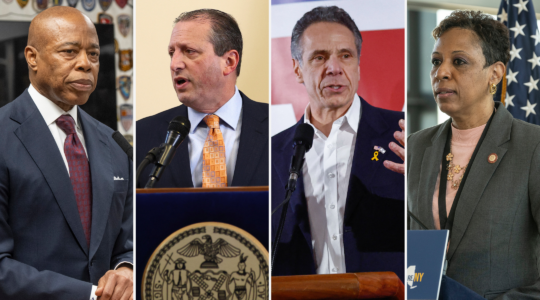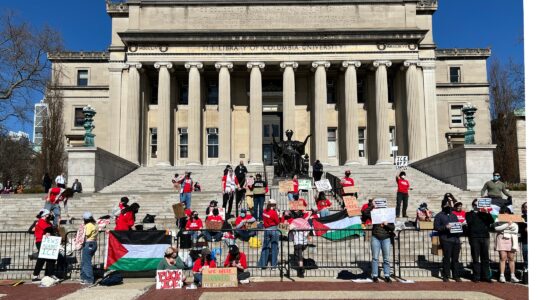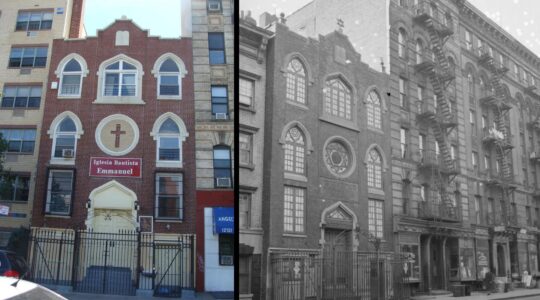Bob Fass, who has hosted the pioneering “free-form” radio show “Radio Unnameable” on New York’s WBAI-FM since 1963, is a vivid and living reminder of a certain generation of Jewish radicals both cultural and political. “Radio Unnameable,” the motion picture that opens on Sept. 19, is a loving portrait of Fass and, quite consciously, of that generation. Produced and directed by Paul Lovelace and Jessica Wolfson, the film traces the rise and painful fall of an era of Jewish-American activism that helped to move forward the civil rights movement, to end the war in Vietnam and eventually to give birth to contemporary environmentalism, feminism and LBGT activism. Regrettably, it also contained within it the seeds of its own disintegration, but that is a story the film tells rather more reluctantly and in occasionally sketchy terms.
Essentially, the documentary is a heartfelt valentine to Fass, who started out as a talented young actor and sort of stumbled into radio almost inadvertently. That is only appropriate. As the film makes abundantly, almost hilariously clear, the creation of WBAI, whose existence has paralleled Fass’ professional life, was also rather unplanned. An eccentric New York millionaire philanthropist, Lou Schweitzer, didn’t like any of the programming he heard on his state-of-the-art radio, particularly the ubiquitous advertising. So he did what anyone with too much money and leisure time would do: he started his own radio station. When he became bored, he gave it away to the progressive Pacifica Foundation.
The result was the flagship of a small chain of listener-sponsored radio stations, probably the first in America. Fass was on the air from midnight to 5 a.m., five nights a week, doing two amazing things that commercial radio had stopped doing or relegated to an afterthought: He featured live music, and he took phone calls from listeners. Anyone who has worked an overnight shift in this town knows that it’s a strange and lonely routine, but Fass miraculously united those otherwise ignored and atomized night workers into a thrillingly ramshackle, makeshift community. And he gave a forum for live performance to such then unfamiliar names as Arlo Guthrie (the first performance of “Alice’s Restaurant” was on “Radio Unnameable”), Phil Ochs and Carly Simon, as well as frequent visitors like Bob Dylan, Allen Ginsberg, Paul Krassner and Abbie Hoffman.
As the tumult of America in the ’60s began, Fass’ show reflected the concerns of his generation and became an active element within it. If the first manifestations of that active community were somewhat frivolous — the film has a particularly juicy sequence about the “Human Fly-In,” a playful gathering at Kennedy Airport — it quickly became more serious, with WBAI’s live coverage of anti-war demonstrations and the like being anchored in no small part by Fass and his band of stalwart on-air friends.
Lovelace and Wolfson don’t delve directly into the Jewish elements of this group of participants and listeners (although it is amusing to hear Fass call his listening community the “cabal” and address them as kabbalists), but there is something uniquely New-York-Jewish about Abbie Hoffman signing off a conversation on the show, “Gut yontif.”
The tragedy of WBAI’s transformation in the 1970s — among other things, Fass and many of the other on-air pioneers were driven out in internal struggles that the film enumerates — is indicative of how the increasing dominance of identity politics came to rule the Left, to the exclusion of the universalist ideals espoused by people like Fass, Hoffman, Ochs and Krassner. Just as every movement-within-the-movement fought for its piece of the limelight, the radio avatars of those identity groups battled for more air time. The result, as the film makes quite clear, is a station whose identity today essentially consists of not actually having an identity but a series of utterly atomized, completely independent identities that seldom communicate or cooperate with one another.
But there’s still Bob Fass. As the film notes in its final credits, he is back on the air on WBAI between midnight and 3 a.m. on the Thursday overnight, still speaking to the city’s truly disenfranchised — the night workers, the insomniacs and the lonely.
“Radio Unnameable,” produced and directed by Paul Lovelace and Jessica Wolfson, opens on Wednesday, Sept. 19 at Film Forum (209 W. Houston St.). For information, call (212) 727-8110 or go to www.filmforum.org.
The New York Jewish Week brings you the stories behind the headlines, keeping you connected to Jewish life in New York. Help sustain the reporting you trust by donating today.




